China Media
Chinese People Attacked with Milk Powder in Amsterdam
Pictures and a video of Dutch men emptying boxes of milk powder over Chinese tourists in Amsterdam have become trending on Chinese social media networks Weixin and Weibo.
Published
9 years agoon
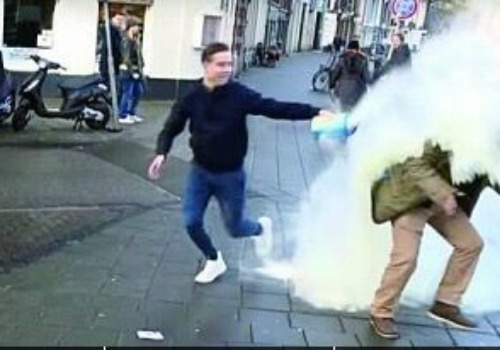
Pictures and a video of Dutch men emptying boxes of milk powder over Chinese tourists in Amsterdam have become trending on Chinese social media networks Weixin and Weibo. Many netizens are angry with the men for insulting Chinese people. A commission has been set up to take legal actions against them.
Chinese media report that two Dutch young men have recently attacked Chinese people with milk powder on the streets in Amsterdam. According to Sina Weibo News, a Chinese netizen wrote on January 25 that two men in Amsterdam were looking out for Chinese people to pass by in the streets of Amsterdam, asking them if they wanted milk powder and then emptying a box of milk powder on them.
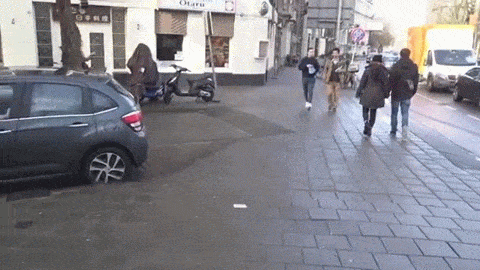
According to Sina Weibo News, the attacks took place because Dutch people are not happy with Chinese people buying up milk powder in Amsterdam.
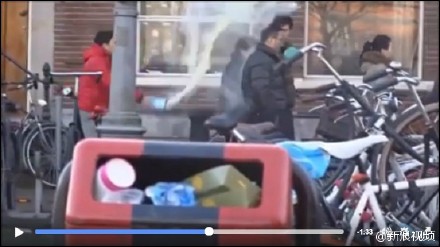
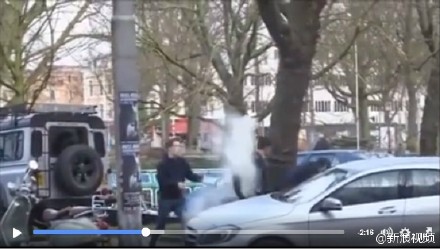
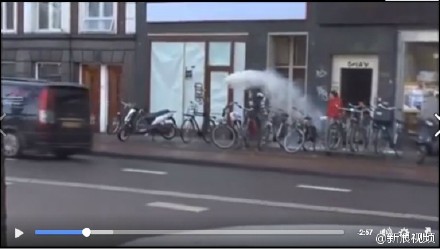
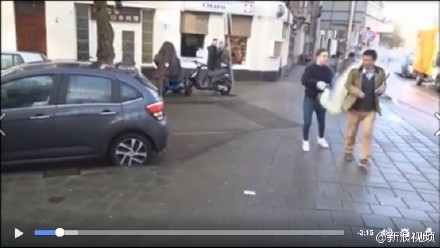
The attacks occurred at different locations in Amsterdam, amongst others at the beginning of the Zeedijk, which is also known as Amsterdam’s ‘China Town’, and at the Stadhouderskade near the Heineken Brewery, which are both popular tourist places.
In the video, you can hear young men asking Asian-looking tourists if they want to buy some Nutrilon milk powder for twenty euros. They then proceed to throw milk powder over the tourists. “In the Netherlands, they are open about drugs and prostitution, and there is a free market, what’s the problem with buying milk powder?” one Weibo netizen wonders. “Only losers would take out their own frustration on other people like that,” another user responds. “They are only wasting milk powder like this!” one other Weibo netizen writes.
The two boys, who are named Rome Terbeek en Kenzo Hanter, have apologized for their actions in another video after their ‘prank’ caused controversy on social media in the Netherlands. In the video they say: “Hereby we would like to apologize for the prank we did in Amsterdam. We don’t have anything against Chinese or foreigners, but that is what it is made to look like now. We thought it would be a funny video and never thought it would turn out this way.” Their apology was also covered by Chinese media.

Although the prank allegedly had no connection with Chinese buying up milk powder, Chinese media do connect this issue to earlier incidents where the ‘panic buying’ of milk powder has led to aggression, such as in last November in Rotterdam, where two Chinese got into a fight over milk powder (screenshot below).
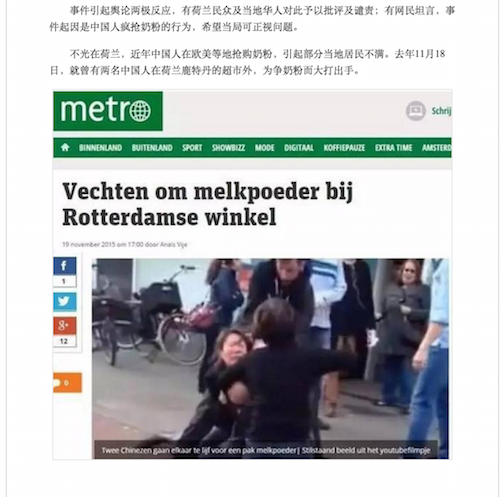
The boys have apologized, but the video and pictures have already become a much-discussed trending topic on Weibo under different hashtags, one being “Chinese splashed with milk powder” (#华人被泼奶粉#). Most Chinese netizens think the news has a direct connection to China’s milk powder problem, and many people are angry at the young men for insulting and bullying Chinese people this way and scold them on Weibo: “You fuckers really have a problem!” or “These fuckers really deserve a beating”, and “We should spill something over these son-of-a-bitches!” and “I only have a middle finger for you two!”
Chinese state media Xinhua and Tencent News report that the Chinese embassy hopes that legal measures will be taken against the two boys. The Chinese embassy in The Hague has stated on 27 January: “We are shocked that this nasty incident has happened in the Netherlands. We hope that the Dutch side will legally deal with this incident and that they will take the necessary measures to avoid such a thing happening again” (“我们对在荷兰发生这样的恶劣事件感到震惊,希望荷方依法处理并采取必要措施,避免此类事件再次发生”).
According to Xinhua News, Chinese media has been in touch with Dutch criminal lawyers, who think that the conduct of the two Dutch men could be classified as slander, discrimination, and bringing intentional harm to others. The Chinese community in the Netherlands has held a meeting and has decided to set up the “Dutch Overseas Chinese Rights Commission” (“荷兰华侨华人维权委员会”). They have asked the victims of the incident to come forward, as the Commission will help them in taking legal action against the men.
“This might have been just a street prank,” one netizen says: “but the issue of milk powder is a very sensitive one for Chinese people. It is just as insulting as it would be for a Muslim to be confronted with a pig’s head.”
Some examples of Chinese (state) media covering this news:
– Global Times
– Phoenix News
– Epoch Times
– China Youth
– China Bridge
– Sina News
– China News Service
– Sohu News
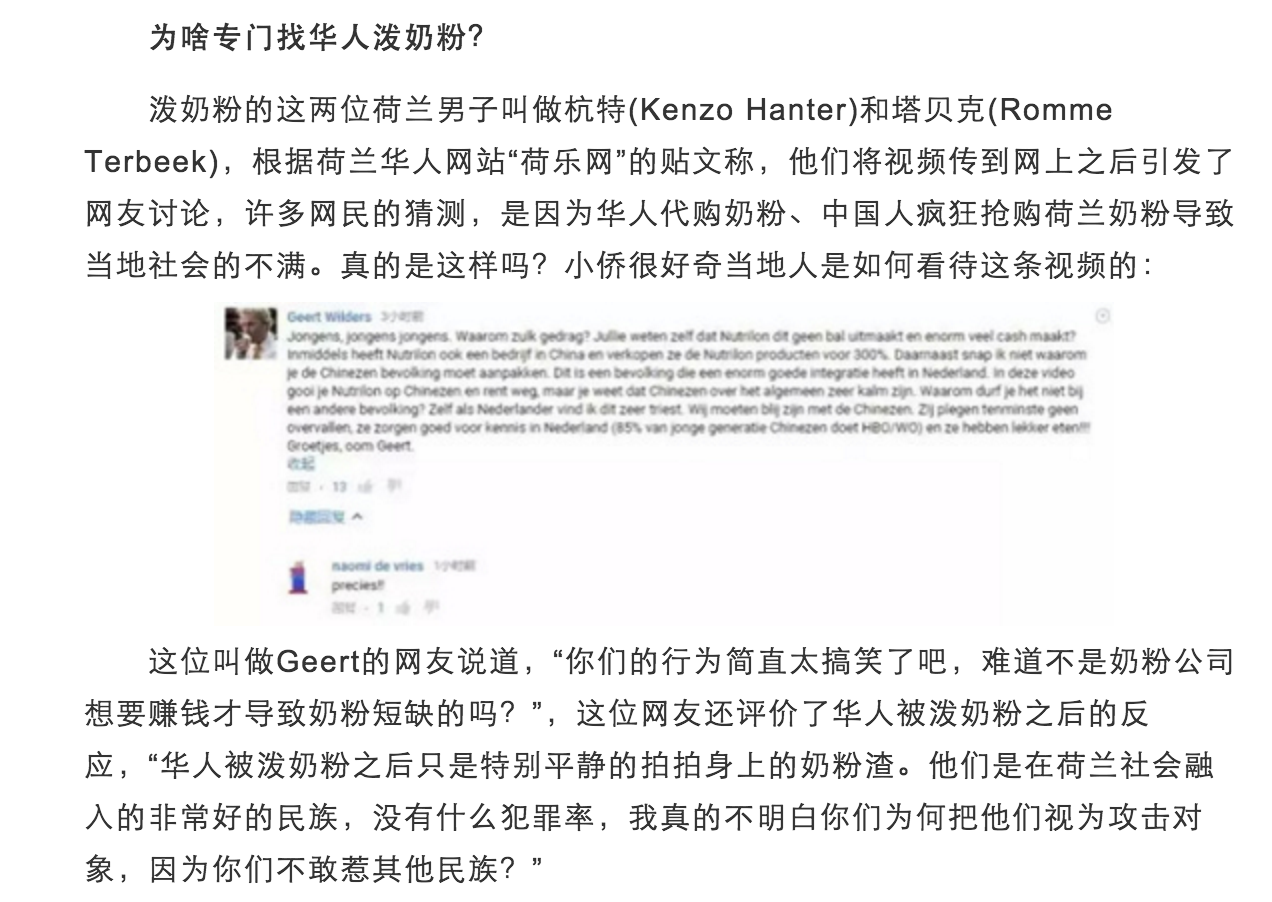
Screenshot of China Bridge News, naming the two boys and quoting a social media comment of a netizen who calls himself Geert Wilders (a well-known Dutch politician) and who says: “Guys guys, why would you do this? You know Nutrilon doesn’t care about this, they make loads of money.” He also says: “Why would you bully Chinese people? They are very well integrated in the Netherlands! They are always very calm, why don’t you dare to bully people of other nationalities?”
– By Manya Koetse
Follow @WhatsOnWeibo
©2016 Whatsonweibo. All rights reserved. Do not reproduce our content without permission – you can contact us at info@whatsonweibo.com.
Manya Koetse is the founder and editor-in-chief of whatsonweibo.com. She is a writer, public speaker, and researcher (Sinologist, MPhil) on social trends, digital developments, and new media in an ever-changing China, with a focus on Chinese society, pop culture, and gender issues. She shares her love for hotpot on hotpotambassador.com. Contact at manya@whatsonweibo.com, or follow on Twitter.

China Media
A Triumph for “Comrade Trump”: Chinese Social Media Reactions to Trump Rally Shooting
Chinese commenters discuss how the bullet aimed at Trump has turned into a moment of triumph.
Published
2 weeks agoon
July 14, 2024
The assassination attempt on former US President Trump at a Pennsylvania campaign event has become a major topic on Chinese social media, where Trump’s swift reaction and defiant gesture after the shooting have not only sparked discussions but also fueled the “Comrade Trump” meme machine.
The chaos that erupted when former US President Trump was injured—a bullet grazing his ear—in an assassination attempt at a Pennsylvania campaign event has become a top trending topic on Chinese social media today.
Trump sustained minor injuries, and the moment he raised his arm to cheer shortly before being evacuated from the stage has already become iconic, captured in widely circulated photographs.
Shortly after the shooting, a shooter armed with a rifle was killed by a US Secret Service counter sniper. The FBI identified the shooter as Thomas Matthew Crooks, a 20-year-old local.
The incident, which occurred on the afternoon of July 13th US local time, resulted in one audience member killed and two others critically injured.
“The campaign efforts will be as smooth as a flying bullet”
On Chinese social media platform Weibo, there are multiple trending hashtags related to the incident, such as “Trump Was Shot” (#特朗普遭遇枪击#, 370 million views); “Trump Says Bullet Pierced His Right Ear” (#特朗普称右耳被子弹击穿#, 440 million views); “Reporter Captures Bullet Grazing Trump’s Ear” (#记者拍到子弹划过特朗普耳朵画面#, 60 million); “Identity of Trump Shooter Confirmed” #枪击特朗普枪手身份确认#, 80 million views). By Sunday afternoon, China local time, half of the top ten hot search topics on Weibo were related to the Trump rally shooting.
“Today, the entire world is watching Trump,” one Chinese Weibo blogger wrote (@乐卡数码).
Political and social commentator Hu Xijin (@胡锡进) reposted a tweet from X by American media influencer Jackson Hinkle, comparing a photo of Trump raising a clenched fist after the shooting to Biden on the ground after falling off his bike near his Delaware home two years ago.
Hu Xijin wrote: “The bullet’s trajectory is so clear, just like how the campaign efforts will now be as fast [smooth] as the flying bullet,” (“好清晰的弹道,和与子弹飞得一样快的助选”).

Post by Hu Xijin
Before this, Hu also commented: “Trump was shot in the ear. This news has shocked everyone. My first reaction after waking up to this news was, ‘how could this happen?’ and I instinctively believe that this incident will garner Trump a lot of sympathy, bringing him one step closer to returning to the White House.”
Media commentator “Media Backpacker” (@媒体背包客) commented on Trump’s quick reaction, noting how he swiftly ducked under the podium after the first shots were fired.
“Several Secret Service agents rushed forward, using their bodies as shields,” he wrote. “Just this scene alone seemed much more professional compared to the attack on Shinzo Abe.” Former Japanese prime minister Shinzo Abe was shot and killed during a campaign event in the city of Nara, Japan, in 2022.
‘Media Backpacker’ also commented: “The person most harmed by Trump getting injured is not Trump himself, but his opponent, Biden.” Many other Weibo commenters also suggested that this dramatic event is rapidly shifting American voter support toward Trump.
“Just based on his quick reaction and how quickly he crouched, I’d vote Trump. If it were Biden, he probably wouldn’t have been able to crouch at all,” one top commenter on Weibo said.
Another commenter dismissed any rumors of the incident being staged: “It’s impossible to stage this; don’t mythologize the sniper. It’s not that precise. A bullet grazing the ear is extremely, extremely, extremely dangerous. No one would risk their life like that.”
Overall, commenters on Chinese social media suggested that the incident will boost Trump’s popularity and solidify his position in the presidential campaign.
On Sunday afternoon, China local time, official channels reported that Xi Jinping has expressed his sympathies to Trump following the shooting incident in Pennsylvania. China’s Foreign Ministry has also addressed the attempted assassination, expressing concern (#习主席已向特朗普表达慰问#).
“From a journalistic perspective, this is the perfect photo”
Besides online discussions on Trump’s quick reaction and the political implications, there’s a lot of interest in the iconic photo of Trump raising his fist, captured by Evan Vucci, who previously won the Pulitzer Prize for Breaking News Photography for his coverage of George Floyd protests.
Some netizens noticed that sellers on several Chinese e-commerce platforms soon started selling T-shirts featuring the now famous photo of the incident, priced between 20-49 yuan ($3-$7). Some stores displayed that they had already sold over 10 items, but this merchandise was soon taken offline in various places.


“From a journalistic perspective, this is the perfect photo,” the well-known knowledge blogger Pingyuan Gongzi Zhao Sheng (@平原公子赵胜) wrote: “The destined son of America facing life-threatening danger, his face smeared with blood, with a clenched fist, roaring: “‘Fight! Fight!’ There’s no need to compare anymore; Biden is suffering a crushing defeat, and the Democrats are bewildered. This scene matches the most traditional American image in Hollywood movies. People don’t care who he is or who he serves, but the president must be tough, hard to defeat, a fearless “barbarian,” a “man of steel.”
“Did Trump write the script for Biden’s press conference?”
As this incident is being framed as a triumph for Trump, it further strengthens his position, especially following Biden’s recent damaging performances.
Earlier this week, Biden mistakenly referred to Ukrainian President Zelensky as “President Putin” during the NATO summit, sparking various hashtags on Chinese social media and making Biden a laughing stock for many netizens.
This was not the only mistake Biden made. On Thursday, he mistakenly referred to Vice President Kamala Harris as “Vice President Trump” during his solo press conference in Washington. In that same conference, Biden also talked about “getting Japan and South Korea back together again.”

Another post by American media influencer Jackson Hinkle being shared on Chinese social media platform Weibo.
Following a messy debate performance against Trump on June 27, voices suggesting it may be time for Biden to step down are growing louder. All of this sparked more discussions on Weibo, where many find the situation funny, suggesting: “Did Trump write the script for this [press conference]?”
Now that the bullet aimed at Trump has turned into a moment of triumph, the contrast between the two US presidential candidates has only grown more stark.
“The bullet pierced my ear, but I can still hear the voice of the Party”
On Chinese social media, Trump is often referred to as “Comrade Jianguo” (建国同志 [Comrade Build-Country]), a nickname that has been circulating for years.
Trump is nicknamed “Comrade Trump” or “Build the Country Trump” (Chuān Jiànguó, 川建国) for “making China great again.” These are just some among many existing memes and jokes about the former US president on the Chinese internet. One reason to call him “Comrade Jianguo” or “Build the Country Trump” is to make fun of his words and actions, suggesting that his leadership only brings America down and in doing so, also further accelerates the rise of China.
But through the years, these playful nicknames have started to reflects a blend of mockery and affection, highlighting the humorous perspective Chinese social media users have towards Trump and his political antics (read more).
In a similar tongue-in-cheek fashion, some Weibo users have now edited the iconic Trump photo, portraying him as a communist hero with the caption: “Workers of the world, unite!” (全世界无产者联合起来) (see featured image).
Other similar edits included captions like: “Long live the great and glorious Communist Party of China!” and “The bullet pierced my ear, but I can still hear the voice of the Party.”

Meme: “Long live the great and glorious Communist Party of China!”

Meme: “The bullet pierced my ear, but I can still hear the voice of the Party.”
Some joked that Trump’s right ear being pierced further emphasized his supposed loyalty to China, comparing him to the panda A Bao, who is missing part of his right ear after being bitten by another panda.


Another commenter wrote: “I wish Comrade Jianguo a speedy recovery, may he continue to work hard for the ultimate mission entrusted to him by the Party.”
By Manya Koetse
Spotted a mistake or want to add something? Please let us know in comments below or email us. First-time commenters, please be patient – we will have to manually approve your comment before it appears.
©2024 Whatsonweibo. All rights reserved. Do not reproduce our content without permission – you can contact us at info@whatsonweibo.com.
China Media
The Beishan Park Stabbings: How the Story Unfolded and Was Censored on Weibo
A timeline of the censorship & reporting of the Jilin Beishan Park stabbing incident on Chinese social media.
Published
2 months agoon
June 12, 2024
The recent stabbing incident at Beishan Park in Jilin city, involving four American teachers, has made headlines worldwide. However, on the Chinese internet, the story was initially kept under wraps. This is a brief overview of how the incident was reported, censored, and discussed on Weibo.
On Monday, June 10, four Americans were stabbed while visiting Beishan park in Jilin.
Video footage of the victims lying on the ground in the park was viewed by millions of people outside the Chinese internet by Monday afternoon.
Despite the serious and unusual nature of such an attack on foreigners visiting China, it took about an entire day for the news to be reported by official Chinese channels.
How the Beishan Incident Unfolded Online
In the afternoon of June 10, news about four foreigners being stabbed in Jilin’s Beishan Park started circulating online.
Among the first online accounts to report this incident was the well-known Chinese-language X account ‘Li Laoshi’ (李老师不是你老师, @whyyoutouzhele), which has 1.5 million followers, along with the news account Visegrád 24 (@visegrad24), which has 1 million followers on X.
They both posted a video showing the incident’s aftermath, which soon went viral on X and beyond. It showed how three victims – one female and two male – were lying on the ground at the park, bleeding heavily while waiting for medical help. A police officer was already at the scene.
As soon as the video and tweets triggered discussions in the English-language social media sphere, it was clear that Chinese social media platforms were censoring and blocking mentions of the incident.
By Monday night, China local time, many Weibo commenters had started writing about what had happened in Beishan Park earlier that day, but their posts became unavailable.
Some bloggers wrote about receiving an automated message from Weibo management that their posts had been taken offline. Others started posting about “that thing in Jilin,” but even those messages disappeared. On other platforms, such as Douyin, the story was also being contained.
By 21:00-22:00 local time, a hashtag on Weibo, “Jilin Beishan Park Foreigners” (吉林北山外国人), briefly became the second most-searched topic before it was taken offline. Weibo stated: “According to relevant laws, regulations, and policies, the content of this topic is not shown.”

A hashtag about the Beishan stabbings soon became one of the hottest search queries before it disappeared.
While netizens came up with more creative words and other descriptions to talk about what had happened, the focus shifted from what had happened in Beishan Park to why the topic was being censored. “What’s this? Why can’t we talk about it?” one Weibo user wondered: “Not a single piece of news!”
Around 23:30 local time, another blogger posted: “It seems to be real that four foreigners were stabbed in Jilin’s Beishan Park this afternoon. We’ll have to see when it will formally be reported on Weibo.” Others questioned, “Why is the Jilin incident so tightly covered up on the internet?”
Around 04:00 local time on June 11, the first media outlet to really report on what had happened was Iowa Public Radio (IPR News). Before that time, one Iowan citizen had already commented on X that their sister-in-law was one of the victims involved.
One victim’s family had told IPR News that the individuals involved were four Cornell College instructors. All four survived and were recovering at a nearby hospital after being stabbed during a park visit in China.
The instructors were part of a partnership with Beihua University in Jilin. Cornell College and Beihua University have had an active partnership since 2018, with Beihua funding Cornell instructors to visit China, travel, and teach during a two-week period. Members from both institutions were visiting the public park in Jilin City when they were attacked. The visit was likely intended as a sightseeing and relaxation opportunity during the Dragon Boat Festival holiday, when many people visit the park.
As reported by IPR News reporter Zachary Oren Smith (@ZacharyOS), U.S. Representative Mariannette Miller-Meeks stated that her office was working with the U.S. Embassy to ensure the victims would receive care for their injuries and safely leave China.
Hu Xijin Post
Now that news of the attack on four Americans was all over X, soon picked up by dozens of international news outlets, the Chinese censorship of the story seemed unusual, considering the magnitude of the story.
Furthermore, there had still been no official statement from the Chinese side, nor any news reports on the suspect and whether or not he had been detained.
By the morning of June 11, an internal, unverified BOLO notice from the Jilin city Chuanying police office circulated online. It identified the suspect as 55-year-old Jilin resident Cui Dapeng (崔大鹏), who was still at large. The notice also clarified that there were not four but five victims in total.
At 11:33 local time, it seemed that the wall of censorship surrounding the incident was suddenly lifted when Chinese political and social commentator Hu Xijin (胡锡进), who has nearly 25 million followers on Weibo, posted about what had happened.
He based his post on “Western media reports,” and commented that this is a time when Chinese and American sides are actually promoting exchange. He saw the incident as a “random” one, which, regardless of the attacker’s motive, does not reflect broader sentiment within Chinese society. He concluded, “I also hope and believe that this incident will not negatively affect the exchanges between China and the US.”
Hu’s post spurred a flurry of discussions about the Beishan Park incident, turning it into a top-searched topic once again. His comments sparked controversy, with many disagreeing with his suggestion that the incident could potentially affect Sino-American exchanges. Many argued that there are numerous examples of Chinese people being attacked or even murdered in the US without anyone suggesting it would harm US-China relations.
Within approximately two hours of posting, Hu’s post was no longer visible and had disappeared from his timeline. This sudden deletion or blocking of his post again triggered confusion: Was Hu being censored? Why?
Later, screenshots of Hu Xijin’s post shared on social media were also censored.
A “Collision”
By the early Tuesday evening, June 11, Chinese official accounts and state media accounts finally issued a report on what had happened in what was now dubbed the “Beishan Park Stabbing Incident” (#吉林公安通报北山公园伤人案#).

Jilin authorities issued a report on what happened in Beishan Park.
A notice from local public security authorities stated that the first emergency call about a stabbing incident at the park came in at 11:49 in the morning on Monday, June 10, and police and medical assistance soon arrived at the scene.
The 55-year-old Chinese suspect, referred to as ‘Cui’ (崔某某), reportedly stabbed one of the Americans after they bumped into each other at the park (described as “a collision” 发生碰撞). The suspect then attacked the American, his three American companions, and a Chinese visitor who tried to intervene. Reports indicated that the victims were all transported to the hospital and were not in critical condition.
It was also stated that the suspect was arrested on the “same day,” without specifying the time and location of the arrest.
Later on Tuesday, the Chinese Ministry of Foreign Affairs addressed the incident during their regular press conference. Spokesperson Lin Jian (林剑) stated that local police had initially judged the case to be a random incident and that they were conducting further investigation (#外交部回应吉林北山公园伤人案#).
Boxer Rebellion References
With the discussions about the incident on Chinese social media less controlled, various views emerged, commenting on issues such as public safety in China, US-China relations, and anti-Western sentiments.
One notable trend during the early discussions of the incident is how many commenters referenced to the ‘Boxer Rebellion’ (1899–1901), an anti-foreign, anti-Christian uprising that took place during the final years of the Qing Dynasty and led to large-scale massacres of foreign residents. Many commenters believed the attacker had nationalist motives targeting foreigners.
Anti-american, nationalist sentiments also surfaced online. Some commenters laughed about the incident or praised the attacker for doing a “good job.”
However, the majority argued that this event should not be seen as indicative of a broader trend of foreign-targeted violence in China. They emphasized that Asians in America are far more frequently targeted in hate crimes than any Westerner in China, underscoring that this incident is just an isolated case.
This idea of the event being “random” (“偶然事件”) was reiterated in official reports, Hu Xijin’s column, and by the Ministry of Foreign Affairs.
But there are also those who think this might be a conspiracy, calling it bizarre for such a rare incident to occur just when Chinese tourism was finally starting to flourish in the post-Covid era: “Now that our tourism industry is booming, foreigners are getting stabbed? How could it be such a coincidence? Is it possible that this was arranged by spies from other countries?”
On Tuesday, social commentator Hu Xijin made a second attempt at posting about the Beishan Park incident. This time, his post was shorter and less outspoken:
“This appears to be a public security incident,” he wrote: “But this time, four foreign nationals were attacked. In every place around the world, there are criminal and public security incidents where foreigners become victims. China is one of the relatively safest countries in the world, but this incident still occurred in broad daylight in a tourist area. This reminds us, that we need to always keep enhancing the effectiveness of security measures to protect the safety of all Chinese and foreign nationals.”
Again, his post triggered some controversy as some bloggers discovered that Hu had previously argued against extra security checks at Chinese parks, which he deemed unnecessary. They felt he was now contradicting himself.

The differing views on Hu’s posts and the incident at large perhaps explain why the news was initially controlled and censored. Although censorship and control are inherent parts of the Chinese social media apparatus, the level of control over this story was quite unusual. Whether it was due to the suspect still being on the loose, public safety concerns, fears of rising nationalist sentiments, or the need to understand the full details before the story blew up, we will likely never know.
Nevertheless, this time, Hu’s post stayed up.
The Beishan Park incident is reportedly still under investigation.
By Manya Koetse
Spotted a mistake or want to add something? Please let us know in comments below or email us. First-time commenters, please be patient – we will have to manually approve your comment before it appears.
©2024 Whatsonweibo. All rights reserved. Do not reproduce our content without permission – you can contact us at info@whatsonweibo.com.
Subscribe

Weibo Watch: The Future is Here

“Bye Bye Biden”: Biden’s Many Nicknames in Chinese

Enjoying the ‘Sea’ in Beijing’s Ditan Park

A Triumph for “Comrade Trump”: Chinese Social Media Reactions to Trump Rally Shooting

Weibo Watch: Get Up, Stand Up

The Tragic Story of “Fat Cat”: How a Chinese Gamer’s Suicide Went Viral

“Old Bull Eating Young Grass”: 86-Year-Old Chinese Painter Fan Zeng Marries 36-Year-Old Xu Meng

A Brew of Controversy: Lu Xun and LELECHA’s ‘Smoky’ Oolong Tea

Singing Competition or Patriotic Fight? Hunan TV’s ‘Singer 2024’ Stirs Nationalistic Sentiments

Zara Dress Goes Viral in China for Resemblance to Haidilao Apron

Weibo Watch: The Battle for the Bottom Bed

About the “AI Chatbot Based on Xi Jinping” Story

China’s Intensified Social Media Propaganda: “Taiwan Must Return to Motherland”

Weibo Watch: Telling China’s Stories Wrong

Saying Goodbye to “Uncle Wang”: Wang Wenbin Becomes Chinese Ambassador to Cambodia
Get in touch
Would you like to become a contributor, or do you have any tips or suggestions? Get in touch here!
Popular Reads
-

 China Insight3 months ago
China Insight3 months agoThe Tragic Story of “Fat Cat”: How a Chinese Gamer’s Suicide Went Viral
-

 China Music4 months ago
China Music4 months agoThe Chinese Viral TikTok Song Explained (No, It’s Not About Samsung)
-

 China Digital10 months ago
China Digital10 months agoToo Sexy for Weibo? Online Discussions on the Concept of ‘Cābiān’
-

 China Arts & Entertainment12 months ago
China Arts & Entertainment12 months agoBehind 8 Billion Streams: Who is Dao Lang Cursing in the Chinese Hit Song ‘Luocha Kingdom’?



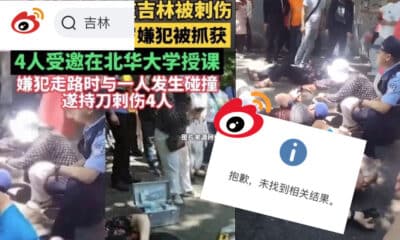



Ed Sander
January 28, 2016 at 11:13 am
What makes you assume these were tourists?
Ed
Manya Koetse
January 28, 2016 at 1:01 pm
Well noted, I adjusted it!
Pepsi
January 28, 2016 at 11:26 am
I was so angry when I saw this I was shaking. If any country knew anything about China, the Chinese, their traditions and culture, they would not even consider such a childish move. I, myself, have had 20+ years experience of the country itself.
Baby milk is valuable in China, the powder on their shelves holds no nutrition, not their fault, but their governments fault. The country doesn’t have such luxuries which is why milk powder is bought abroad by many parents.
I’m surprised the Chinese tolerate us westerners still and wouldn’t blame the Chinese if they rebelled. Which they won’t because they don’t like confrontation or debate.
The Chinese are peaceful people. For all who are from outside of China…treat the Chinese with respect and how you yourselves wish to be treated. Otherwise, LEAVE THEM ALONE AND IN PEACE!
Sander from Holland
January 28, 2016 at 4:33 pm
Hmmm… I think you missed that communist part of their culture. I had to work together with a Chinese girl for a few months and I noticed her enormous shyness and she was also afraid to tell about her country. She even was afraid for repercussions, even in Holland/Netherlands for the slightest critics onto her country. For me unimaginable that this is still possible in 2016
laowai
January 30, 2016 at 6:03 am
@Pepsi
This was a tasteless joke and not funny at all. But you’re really a little whiner, my god.
I live in Shanghai and I can tell you that there are a lot of Chinese who are not peaceful. So stop crying and get a life
Jason
May 25, 2016 at 12:40 pm
Thank you for your understanding, as an exchange student in Barcelona, I am feeling shocked to see that as well. We buy the milk powder because we want our babies to grow up safely.
LOL
January 28, 2016 at 2:56 pm
Haha don’t get your panties in a bunch, it’s a tasteless joke but still pretty funny. Realize this is funny to some Dutch people as Chinese people literally fight each other over baby powder in our stores and more often then not baby powder milk is not available to Dutch people because Chinese people buy it all to resell it to China 😉
The world would be a better place if folks wouldn’t get insulted so fast..
Sander from Holland
January 28, 2016 at 4:10 pm
It is literally a matter of life and dead for the Chinese, because they poison all their milk in China
A. from Groningen
March 14, 2016 at 5:28 pm
If this was the other way… Chinese adults throwing dirty water on Dutch tourists / Dutch students in China, you wouldn’t find it so funny. This is worse when baby milk-powder is actually a very sensitive topic in China.
I am a Korean-Brit in the netherlands, I’ve gotten pushed off my bike while riding at times while being called a Shanghai c*nt wh*re. 🙂 I’ve had people chasing me around telling me they want to rape me :)….. because I am an asian looking woman.
It’s not nice. It’s not funny.
It IS insulting. And its frightening.
Bjorn
March 15, 2016 at 5:43 am
It’s tasteless, not funny, and uncalled for. Besides, powdered milk is scarce because factories don’t produce enough, you can’t blame Chinese people. What people do with products bought in supermarkets (use it themselves or resell) is up to themselves.
Really?
January 28, 2016 at 3:17 pm
@Pepsi:
The chinese people are peaceful people?
Maybe, but tell that to the people in Tibet. They have a different experience with the Chinese.
Jason
May 25, 2016 at 12:46 pm
Don’t mix up Chinese citizens with Chinese governments, and you do not understand the real situation on What Tibet is going through. Just like Catalonia wants independence, some people in Tibet wants independence but they could not represent the whole population of a region, what you hear and see is simply what those people wants to show.
Maaike
January 28, 2016 at 3:20 pm
This just makes me so sad in many ways. Personally, I don’t think how anyone above the age of, let’s say, 5, could find this funny. But there’s no accounting for taste. Still, it angers me that people out of boredom spill good food, while others are starving, while at the same time being a real nuisance to the people they poke fun at. Shame on you, boys, shame on you…
Simon
January 28, 2016 at 3:24 pm
Reactions on a Dutch blog where this was published were all very negative. These guys have the brains of a shrimp and are not funny at all.
Sander from Holland
January 28, 2016 at 4:08 pm
I sincerely hope for this guys the Chinese laws don’t apply here in the Netherlands. I can imagine the Dutch government will be held under pressure by the CCP to punish these guys, because of the economic dependency of Holland to China. They probably won’t survive it and their families can buy their organs back…
Peppi
January 28, 2016 at 4:46 pm
I had to laugh at the Chinese Embassy in the Netherlands in this article, they are notorious for refusing to pay their rental fee of the building, and they don’t care. But now they want justice?
Henk
January 28, 2016 at 5:57 pm
I am Dutch and there is absolutely no excuse for such behavior. Hell nobody cares if Chinese buy the milk powder especially not those two boys. They are plain and simple just morons trying to be funny to get attention. If I saw them do it I would punch them in the face until they apologized. I feel really bad for their victims. Let’s hunt them down, and hand them over to the authorities.
Dutch J
January 28, 2016 at 6:38 pm
=January 28, 2016 at 5:57 pm
Hell nobody cares if Chinese buy the milk powder especially not those two boys.=
Oh hell yes we care. More often than not, Dutch nationals stand for an empty shelf because the milkpowder has been hamstered by the Chinese.
The fact that babies die in China because of bad powdered milk is not our problem to begin with but becomes so because our product gets bought up in wholesale to ship it to China.
Ting
September 20, 2016 at 5:48 pm
I’m chinese, but I’m absolutely against the chinese people buying up milk powder in europe, no matter they’re tourists or residents. Those people have very good excuses to cover themselves up, such as: we care about our own people, or we’re doing it in legal way, not robbing or stealing, we’re buying with money! The hell they care, it’s money they are making out of, living in another country but causing problems to the local people, not trying to integrate into the country but doing such business, robbers with money. At the same time they show off on Weibo about their “happy” lives in Europe, I see these people as real losers.
Now that I’m living in Germany myself, I’ve always planned to write one article about this phenomenon, instead of focusing on the milk powder scandle or food safety in China, I’ll write about the people who are doing this. It’s not only about milk powder, but also other baby stuff.
I want to say to those chinese people: fingers off! (in real life I would say that in Chinese though)
Ed Sander
January 28, 2016 at 9:53 pm
True, this punks could not care less about milk powder themselves. But the fact that they came up with this ‘prank’ does prove that the issue of milk powder and Chinese is a sensitive and controversial one.
This recent Dutch article gives a very thorough analysis of the problem: http://www.deondernemer.nl/nieuwsbericht/38064/babymelkmaffia-deinst-nergens-voor-terug
To me, the biggest Chinese mystery has always been that Chinese government can employ 2 million people to police the internet, but they can’t clean up an essential sector like the dairy industry.
Sjaak
January 29, 2016 at 12:50 am
Ok it might have been stupid prank like most pranks are.
Dont take it so hard, nobody got hurt and if China wants more Nutrilon than ask the producer to produce more.
I think not long ago they decided to produce it in Germany specially for Chinese market.
Give it some time.
Oh and they’re €10-12 here 😉
Richard Woltz
January 29, 2016 at 1:22 am
I am Dutch and think these two stupid boys are very confused about the concept of humour.
T
January 29, 2016 at 1:36 pm
What a stupid behavior. In Holland and Amsterdam especially, we don’t have any problems with Asians and/or Chinese people. As a Dutchman living in Amsterdam I feel really embarrassed by this ‘joke’.
Jan
January 29, 2016 at 5:42 pm
L.s.
In any country you have scum.
This is a Dutch guy – scum
and an Maroccon guy – scum.
Most people in Amsterdam are nice.
Too bad they have not been beaten up.
I am a 4th generation man from
Amsterdam.
Now fanatic Muslims are invading Holland/Europe so things will
become much worse. I hope
for the Chinese people to be more
smart than Merkel and keep them out of your country. By the way.
If YOU like these people please let us know We will be glad to send them over. We will pay the tickets.
Take care.
Han..
frank man
January 30, 2016 at 1:27 am
We start a group on face book “NIET leuk,NOT amused,不再容忍,for the chinese communities in Holland to show they are not amused and we hope you will sign our petition too. Please support us.
laowai
January 30, 2016 at 6:05 am
Seriously, Frank man?
Get a life, loser
Lol
Walao
July 12, 2016 at 4:26 am
You live in Shanghai and you get your panties in a bunch over people speaking up for the chinese people? How about you get out of that country, “laowai”?